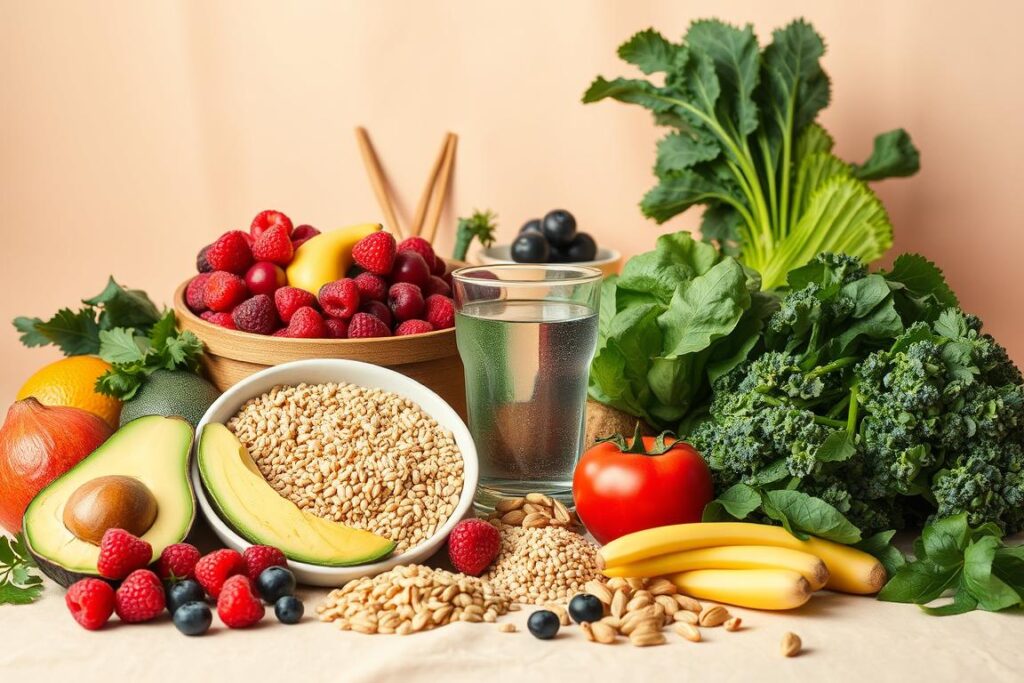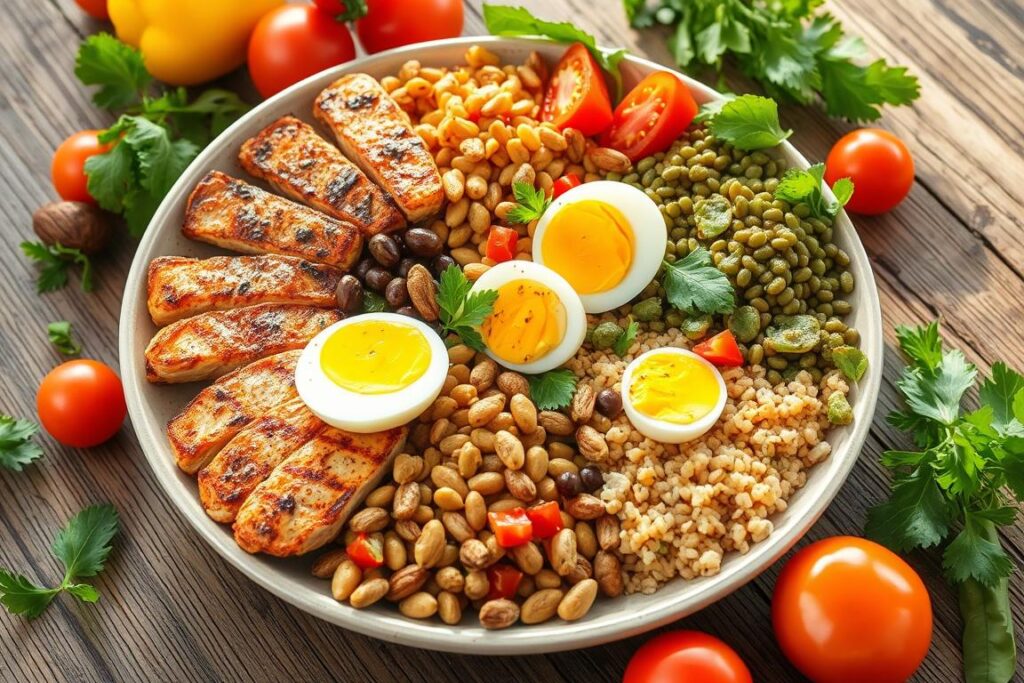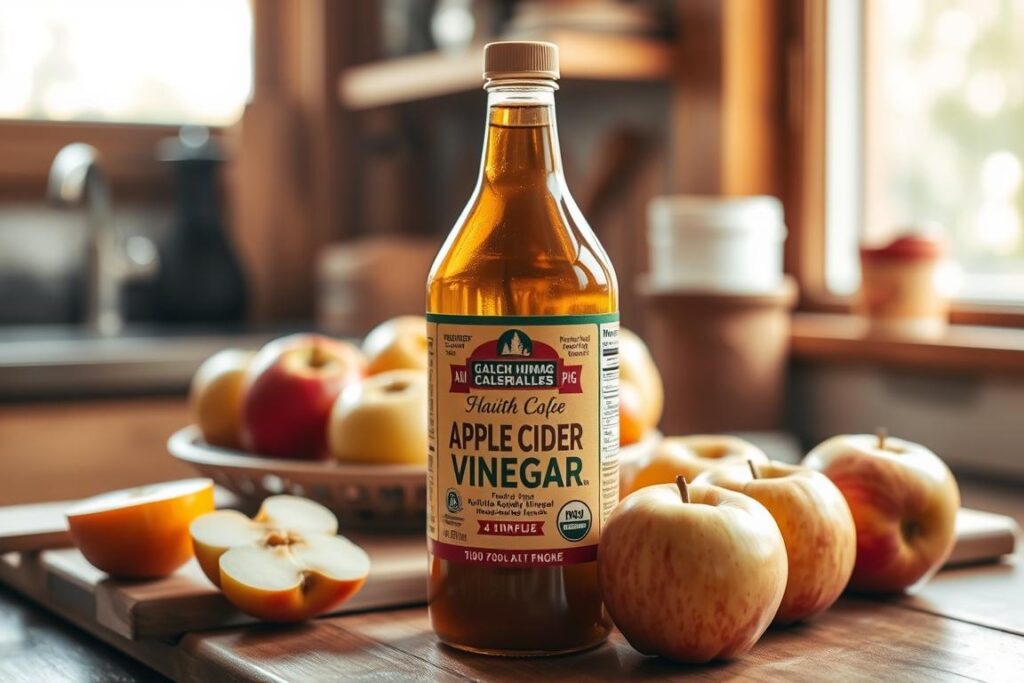What is the role of healthy eating during the gestation? It is crucial for the health of both mother and baby. A balanced diet helps prevent complications and ensures a healthy baby weighing between 2.5 and 4.0 kilograms.
THE nutrition during the gestation is essential. Drink 2 to 3 liters of water per day helps to avoid complications. Eating lean proteins, calcium and iron in the second trimester is vital for the health of both.
THE gestation is a critical time for the health of both mother and baby. healthy eating plays a fundamental role. The food maternal provides the essential nutrients for the fetal development and the mother's health.
The importance of nutrition during pregnancy
THE nutrition during pregnancy is essential for the baby and the mother's health. A balanced diet can prevent complications and ensure a healthy birth. nutrition adequate influences the fetal development, providing the necessary nutrients.
To the nutritional needs during pregnancy are specific. They must be met for the health of the mother and baby. This includes essential nutrients as folic acid, iron and calcium.
How nutrition affects fetal development
THE food of the mother influences the fetal development in several ways. A balanced diet provides the necessary nutrients. On the other hand, an inadequate diet can increase the risk of complications.
Specific nutritional needs of pregnancy
To the nutritional needs during pregnancy include essential nutrients. These include:
- Folic acid
- Iron
- Calcium
- Proteins
- Good fats
The role of nutritional monitoring
Nutritional monitoring is crucial during pregnancy. It ensures that the mother is getting the necessary nutrients. A nutritionist can create a nutritional plan food customized to meet the nutritional needs specific.

Benefits of nutrition during pregnancy for maternal health
THE healthy eating is essential during the gestation. It helps maintain a healthy weight and produce quality milk.
Benefits include:
- Prevent complications during pregnancy
- Ensure a healthy recovery after childbirth
- Help prevent chronic diseases
To the pregnant women must follow the Food Guide. It is important to eat natural or minimally processed foods. Avoid ultra-processed foods and use oils, fats, salt and sugar in moderation.

One healthy eating influences the child's habits. It can prevent obesity and chronic diseases. Therefore, it is crucial for maternal health and the baby.
| Benefits of healthy eating during pregnancy | Description |
|---|---|
| Prevent complications during pregnancy | THE healthy eating can help prevent complications during pregnancy, such as hypertension and gestational diabetes. |
| Ensure a healthy recovery after childbirth | Healthy eating can help ensure a healthy recovery after childbirth, reducing the risk of infections and other complications. |
Essential nutrients for a healthy pregnancy
For a healthy pregnancy, it is important to eat well. The essential nutrients are folic acid, iron, calcium and vitamin D. They help both baby and mother develop well.
Getting enough of these nutrients can help prevent problems during pregnancy. For example, folic acid is crucial in early pregnancy to prevent neural tube defects. Iron helps prevent anemia in both mother and baby.
Folic acid and its importance
Folic acid is vital to prevent birth defects, especially neural tube defects. Women of childbearing age should consume folic acid before and during pregnancy.
Iron and anemia prevention
Iron is essential for the production of hemoglobin and to prevent anemia. During pregnancy, the need for iron increases greatly. Without it, the mother may suffer from anemia and the baby may not grow well.
Calcium and vitamin D
Calcium and vitamin D are crucial for the baby's bone development and the mother's health. A lack of calcium can cause problems in the mother and fetus, such as osteopenia and growth problems.
In conclusion, one healthy pregnancy requires a diet rich in folic acid, iron, calcium and vitamin D. Pregnant women should speak to a doctor to find out how to improve their diet and supplementation.
Recommended foods during pregnancy
You recommended foods during pregnancy include fruits, vegetables, lean meats, and dairy products. These foods are rich in essential nutrients. They help ensure that your baby is born healthy.
Including a variety of foods in your diet is important. For example, citrus fruits help in the absorption of iron. Dairy products are essential for the formation of the fetus' skeleton. Furthermore, fish rich in omega-3, such as salmon and sardines, are good for fetal brain development.
A balanced diet during pregnancy may include:
- Four to five servings of dairy per day
- Three servings of vegetables, legumes and fruits per day
- Two servings of lean meats a day
- A minimum consumption of two liters of water per day
It is important to avoid excess salt and sugar. Keep a control weight gain is also essential. With a balanced diet rich in nutrients, pregnant women can reduce the risk of complications. Thus, they ensure healthy development for your baby.
How to create a balanced menu for pregnant women
One balanced menu to pregnant women should have fruits, vegetables, lean meats and dairy products. It is essential to vary the foods in each meal. This way, mother and baby receive all the necessary nutrients.
According to experts, a balanced menu for pregnant women should be varied. Here are some tips for a healthy menu:
Ideal breakfast
THE breakfast is crucial as it provides energy for both mother and baby. Fruits, yogurt, granola and whole grain bread are good options.
Lunch and dinner suggestions
For the lunch and to have lunch, choose healthy foods. Include lean meats, fish, fruits, vegetables, and dairy products. Salads, soups, grilled chicken, and baked fish are good choices.
Healthy snacks between meals
It is important to have healthy snacks between meals. Fruits, nuts, seeds and yogurt are great options.
Additionally, a healthy diet should begin 2 to 3 months before conception. A balanced diet helps in the development of the fetus and prepares the mother for breastfeeding.
| Snack | Healthy options |
|---|---|
| Breakfast | Fruits, yogurt, granola, whole wheat bread |
| Lunch | Lean meats, fish, fruits, vegetables, dairy products |
| To have lunch | Salads, soups, grilled chicken, baked fish |
| Snacks | Fruits, nuts, seeds, yogurt |
Food safety precautions during pregnancy
During pregnancy, it is essential to take good care of your diet. This helps the health of both mother and baby. food safety is very important. This is because eating bad foods can cause serious problems.
Studies show that eating too many ultra-processed foods can cause a mother to gain too much weight. This can also cause a baby to be born heavier. This is not good for the health of both of you.
Foods to avoid
There are some foods that pregnant women should avoid. For example:
- Ultra-processed foods
- Raw or undercooked food
- Foods with a lot of caffeine
- Foods with a lot of sugar
Food hygiene practices
To have food safety, it is important to follow some rules. For example:
- Wash your hands thoroughly before preparing food
- Wash food before eating
- Cook food until it is well cooked
- Store food in clean, cool places
Maintaining a balanced, nutrient-rich diet is crucial. It is important to have plenty of folic acid, iron and calcium. The gestation is a very important moment for the health of mother and baby. Therefore, food safety is essential for healthy development.
| Food | Benefit |
|---|---|
| Fruits | Rich in vitamins and minerals |
| Vegetables | Rich in protein and fiber |
| Whole grains | Rich in complex carbohydrates and fiber |
Control of gestational weight gain
THE gestational weight gain is crucial during pregnancy. It affects the health of both mother and baby. Studies show that controlling weight is essential for a healthy pregnancy.
Pregnant women should gain between 11 and 16 kg. This is recommended for those with a healthy BMI.
A balanced diet and exercise help control of gestational weight gain. A study showed that 54.5% of pregnant women who used contraceptive techniques control of weight had a healthy weight. In addition, healthy eating is very important.
Being overweight can cause problems such as high blood pressure and gestational diabetes. Therefore, it is vital to follow healthy weight guidelines. Maintaining a balanced diet and getting regular exercise are essential.
- Maintain a balanced, nutrient-rich diet
- Get regular exercise, such as walking or swimming
- Avoid processed and sugar-rich foods
- Drink plenty water and stay hydrated
Common symptoms and how diet can help
Nutrition is very important during pregnancy. It can help reduce symptoms such as nausea and vomiting. Eating light foods, such as fruits, vegetables and whole grains, helps a lot.
In addition, food helps to avoid heartburn and reflux. It is best to avoid fatty and spicy foods. Opt for light and more frequent meals.
Preventing constipation
THE constipation is a common problem during pregnancy. To avoid it, it is important to eat plenty of fiber. Fruits, vegetables, and whole grains are great. It is also essential to drink plenty of water and avoid processed foods.
In short, diet helps a lot during pregnancy. It is important to eat light foods that are rich in fiber and nutrients. Avoid processed and fatty foods.
| Symptom | Prevention |
|---|---|
| Nausea and vomiting | Light and easy to digest foods |
| Heartburn and reflux | Avoid fatty and spicy foods |
| Constipation | Diet rich in fiber and water |
Hydration during pregnancy
THE hydration is essential for the health of the mother and baby during pregnancy. According to the European Agency for Food Safety, pregnant women should drink more water. They should increase their daily consumption by at least 300 ml. The recommendation is 2 to 3 liters of water per day.
In addition to the water, milk is a good option. It has 90% of water and help in hydration. Fruits and vegetables are also rich in water and can help. Including 500 g of vegetables in the daily diet is recommended.
Ideal amount of water
Drinking well helps prevent urinary infections and relieves symptoms. hydration can also reduce the formation of stretch marks. This improves the elasticity of the skin. It is important to avoid prohibited drinks that contain caffeine or alcohol, as they can harm the baby.
Allowed and prohibited drinks
Pregnant women should avoid prohibited drinks and choose to permitted drinks. This helps in hydration. Some permitted drinks they are:
- Water
- Milk
- Fruit juice
- Caffeine free tea
It is crucial to stay hydrated during pregnancy. This ensures the health of both mother and baby.
Food supplementation during pregnancy
THE food supplementation during pregnancy is very important. It helps ensure that mother and baby have all the essential nutrients. Many pregnant women are deficient in vitamins and minerals, affecting the baby's health for the rest of its life.
Some crucial nutrients include:
- Folic acid, essential for the formation of the fetal neural tube
- Vitamin D, which may prevent preeclampsia and gestational diabetes
- Omega-3, associated with positive effects that can last for years in the child's life
- Calcium, necessary for the baby's bone formation and to prevent bone loss in the mother
THE food supplementation can be done with supplements. For example, the Future Multivitamin has important vitamins and minerals. The Genial omega-3 supplement is also recommended for its high purity and benefits for children's immune systems.
THE gestation is a crucial moment for the health of mother and baby. food supplementation can be a valuable aid. But it is essential to speak to a doctor before starting any supplement.
Myths and truths about nutrition during pregnancy
Many myths and truths circulate over the food in the gestation. Studies show that the nutrition in childhood, including the fetal period, affects human survival and development.
Some truths important about the food in the gestation they are:
- It is crucial to consume essential nutrients such as iron, vitamin C, omega 3, fiber and calcium. They are important for the health of both mother and baby.
- Excess sugar and caffeine can harm the health of the pregnant woman and the fetus.
- Parents can help in food of the pregnant woman planning meals and shopping. Support in food must be together.
THE food in the gestation should be rich in nutrients, not in quantity of food. It is essential to avoid myths and seek reliable information for a gestation healthy.
Conclusion
Healthy eating is crucial during pregnancy. Follow a balanced diet is essential for the health of both mother and baby. It helps in fetal development and in the well-being of pregnant women.
It is important to avoid foods with bacteria or toxins. It is also essential to consult health professionals. This ensures a healthy pregnancy.
Studies show that the adequate folic acid intake, iron and calcium improves health. This reduces the risk of premature birth and low birth weight. A good hydration and the nutritional supplementation are also important.
Adopting healthy eating habits brings benefits. Pregnant women may have a peaceful pregnancy and a healthy baby. balanced diet is the key to the development and well-being of all.


